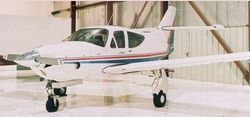Wed, Mar 19, 2014
Two Fatally Injured When Airplane Went Down In An Apartment Complex Parking Lot.
The NTSB has released a probable cause report from an accident that occurred May 28, 2011 in Bryan, TX that fatally injured the pilot and a passenger on board a Rockwell 112.

A review of the pilot’s logbooks revealed that he had flown two flights in the airplane several days before the accident flight for a total of 2.8 flight hours. The airplane was not refueled after those flights. About 1.4 hours after takeoff on the accident flight, the pilot reported that he was “running out of fuel,” and the airplane subsequently started descending. A witness reported seeing the airplane at a low altitude and then suddenly turn and depart controlled flight, indicating than an aerodynamic stall had occurred.
The airplane impacted terrain in the parking lot of an apartment complex in a congested urban area. Engine data monitor information for the accident flight showed that, for most of the flight, the airplane had an average fuel flow of about 14.7 gallons per hour. The airplane had a total useful fuel capacity of 62 gallons. A postaccident examination of the airframe and engine revealed no evidence of mechanical malfunctions or failures that would have precluded normal operation. It is likely that the pilot improperly planned how much fuel he would need for the accident flight and that the airplane ran out of fuel, which resulted in a loss of engine power due to fuel exhaustion, according to the report.
The pilot's medical records revealed a diagnosis of major depression, and toxicology testing found medications in the pilot’s body consistent with the treatment of this condition. The pilot’s depression had been documented and treated since 1989, but the treatment and medications were inadequately reported to the Federal Aviation Administration on the pilot's recent airman medical applications and would have disqualified him from obtaining an airman's medical certificate. The NTSB indicated that the pilot's depression and the medications he was taking would have significantly degraded his cognitive abilities, including executive functioning and judgment, and likely led to his failure to recognize the fuel shortage earlier and his improper decision to fly with disqualifying medical conditions.
The National Transportation Safety Board determines the probable cause(s) of this accident to be the pilot's inadequate fuel planning, which resulted in a loss of engine power due to fuel exhaustion, and his improper control inputs following the loss of engine power, which resulted in an aerodynamic stall and subsequent loss of control. Contributing to the accident was the pilot's impaired judgment, which led to his failure to recognize the fuel shortage earlier and his improper decision to fly with disqualifying medical conditions.
(Rockwell 112 pictured in file photo. Not accident airplane)
More News
Aero Linx: International Federation of Airworthiness (IFA) We aim to be the most internationally respected independent authority on the subject of Airworthiness. IFA uniquely combi>[...]
Ultrahigh Frequency (UHF) The frequency band between 300 and 3,000 MHz. The bank of radio frequencies used for military air/ground voice communications. In some instances this may >[...]
A Few Questions AND Answers To Help You Get MORE Out of ANN! 1) I forgot my password. How do I find it? 1) Easy... click here and give us your e-mail address--we'll send it to you >[...]
From 2019 (YouTube Edition): Learning To Paint Without Getting Any On Your Hands PPG's Aerospace Coatings Academy is a tool designed to teach everything one needs to know about all>[...]
Also: Sustainable Aircraft Test Put Aside, More Falcon 9 Ops, Wyoming ANG Rescue, Oreo Cookie Into Orbit Joby Aviation has reason to celebrate, recently completing its first full t>[...]
 ANN's Daily Aero-Linx (05.06.25)
ANN's Daily Aero-Linx (05.06.25) ANN's Daily Aero-Term (05.06.25): Ultrahigh Frequency (UHF)
ANN's Daily Aero-Term (05.06.25): Ultrahigh Frequency (UHF) ANN FAQ: Q&A 101
ANN FAQ: Q&A 101 Classic Aero-TV: Virtual Reality Painting--PPG Leverages Technology for Training
Classic Aero-TV: Virtual Reality Painting--PPG Leverages Technology for Training Airborne 05.02.25: Joby Crewed Milestone, Diamond Club, Canadian Pilot Insurance
Airborne 05.02.25: Joby Crewed Milestone, Diamond Club, Canadian Pilot Insurance



